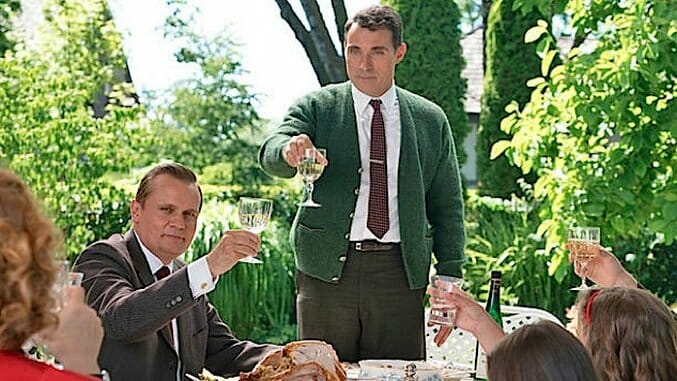The Man in the High Castle: “Three Monkeys”
(Episode 1.06)

Five episodes in, and the central issues with The Man in the High Castle have become readily apparent. As a piece of world building, it’s an incredible achievement. The production design, costumes and general atmosphere gloriously succeed at painting a world that feels simultaneously familiar and alien. Ultimately, it’s the vanilla characters at the center of these environments that have been the weight around the show’s neck for the past few hours.
“Three Monkeys” goes a long way towards fixing this “all sizzle no steak” notion, honing in on the supporting characters and conflicts that have, thus far, given the show its zest. What emerges is an installment that continues to play in its alternative history sandbox, while still providing the proper real estate to sketch out its various players.
The episode’s central storyline involves Nazi officer John Smith—hands down the show’s most intriguing character—inviting Joe Blake—hands down, the show’s dullest character—to a celebration at his house. After five episodes spent depicting John as a cold, calculating figure, seeing him put forth as a loving family man provides some much needed layers to the show’s string of more simplistic characterizations. At the same time, the visit also offers further details of America’s newly mixed cultural makeup. Though John’s son is seen dressed as a Hitler Youth, the family enjoys apple pie and baseball (apparently a frowned-upon sport) just as much as any all-American clan.
This seemingly straightforward gathering grows more complicated after John and Joe travel to the airport, only to find John’s fellow officer/secret subversive Rudolph Wegener waiting around. John invites him back to his house and the two begin reminiscing about old times. It soon becomes increasingly obvious that their run-in was no accident.
Perhaps most notably, this plotline finally has the show addressing the elephant in the room—the Holocaust. As John and Rudolph drink more and more, the pleasantries give way to a repressed anger, with Rudolph questioning how they could possibly justify the things they have done. For his part, John has adopted an out-of-sight-out-of-mind notion. In his head, the atrocities they’ve committed are merely the standard war traumas that bond men together. Rudolph obviously does not share this vision. What’s more, in a brilliant piece of subtle characterization, he references John’s abandoning of his sailing habit as evidence of his eroding humanity. Where at one point, John would take off sailing with a bottle of alcohol as a means of coping with his participation in such genocide, he seemingly no longer requires such rituals. Indeed, the only downside of the two’s powerful, charged exchange is how Joe Blake is shoehorned into these pivotal moments. With each episode, it’s becoming more and more unbelievable that people seem so trusting and taken with such a flat cipher.
-

-

-

-

-

-

-

-

-

-

-

-

-

-

-

-

-

-

-

-

-

-

-

-

-

-

-

-

-

-

-

-

-

-

-

-

-

-

-

-








































